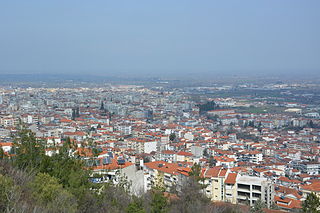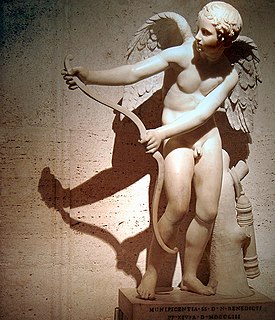Apollodorus (Greek : Ἀπολλόδωρος; fl. 1st century AD) was an ancient Macedonian runner who, after winning in Olympics, was killed by lightning on his way back home. He is commemorated by Antipater of Thessalonica in the below epigram ( Greek Anthology 7.390):

Greek is an independent branch of the Indo-European family of languages, native to Greece, Cyprus and other parts of the Eastern Mediterranean and the Black Sea. It has the longest documented history of any living Indo-European language, spanning more than 3000 years of written records. Its writing system has been the Greek alphabet for the major part of its history; other systems, such as Linear B and the Cypriot syllabary, were used previously. The alphabet arose from the Phoenician script and was in turn the basis of the Latin, Cyrillic, Armenian, Coptic, Gothic, and many other writing systems.

The Macedonians were an ancient tribe that lived on the alluvial plain around the rivers Haliacmon and lower Axios in the northeastern part of mainland Greece. Essentially an ancient Greek people, they gradually expanded from their homeland along the Haliacmon valley on the northern edge of the Greek world, absorbing or driving out neighbouring non-Greek tribes, primarily Thracian and Illyrian. They spoke Ancient Macedonian, a language closely related to Ancient Greek, perhaps a dialect, although the prestige language of the region was at first Attic and then Koine Greek. Their religious beliefs mirrored those of other Greeks, following the main deities of the Greek pantheon, although the Macedonians continued Archaic burial practices that had ceased in other parts of Greece after the 6th century BC. Aside from the monarchy, the core of Macedonian society was its nobility. Similar to the aristocracy of neighboring Thessaly, their wealth was largely built on herding horses and cattle.

Lightning is a violent and sudden electrostatic discharge where two electrically charged regions in the atmosphere temporarily equalize themselves, usually during a thunderstorm.
Κυλλήνην ὄρος Ἀρκάδων ἀκούεις· | You know Cyllene the Arcadian mountain;  Mount Kyllini or Mount Cyllene, is a mountain on the Peloponnese in Greece famous for its association with the god Hermes. It rises to 2,376 m (7,795 ft) above sea level, making it the second highest point on the peninsula. It is located near the border between the historic regions of Arcadia and Achaea—in the northeast of Arcadia, and entirely within modern Corinthia. It is located west of Corinth, northwest of Stymfalia, north of Tripoli, and south of Derveni.  Zeus is the sky and thunder god in ancient Greek religion, who rules as king of the gods of Mount Olympus. His name is cognate with the first element of his Roman equivalent Jupiter. His mythologies and powers are similar, though not identical, to those of Indo-European deities such as Indra, Jupiter, Perkūnas, Perun, and Thor. |
Every year the Race of Apollodoros (Greek : Δρόμος Απολλοδώρου) is organized in modern Aiani and Veria (Greece).

Aiani is a town and a former municipality in the Kozani regional unit, Macedonia, Greece. Since the 2011 local government reform it is part of the municipality Kozani, of which it is a municipal unit. The 2011 census recorded 2,006 residents in the village and 3,429 residents in municipal unit of Aiani. The municipal unit has an area of 156.004 km2, the community 52.336 km2.

Veria, officially transliterated Veroia, historically also spelled Berea or Berœa, is a city in Macedonia, northern Greece, located 511 kilometres north-northwest of the capital Athens and 73 km (45 mi) west-southwest of Thessalonica.

Greece, officially the Hellenic Republic, historically also known as Hellas, is a country located in Southern and Southeast Europe, with a population of approximately 11 million as of 2016. Athens is the nation's capital and largest city, followed by Thessaloniki.









